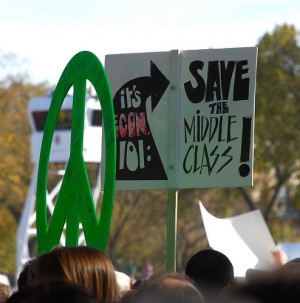On Blaming the Black Middle Class
“Stop Picking on the Black Middle Class; It didn’t abandon urban communities, despite what some say,” is the headline of Natalie Hopkinson’s article in The Root.
The piece references a recent Washington City Paper article, which asked “As parents in places like Capitol Hill embrace neighborhood schools, has D.C.’s black middle class given up on them?” Hopkinson answers, “If I were looking for a culprit in a racial group, the black middle class is the very last place that I’d be sniffing around.”
Hopkinson also describes her attempt to stop her next-door neighbor from selling crack. Confronting the man and shaming his customers didn’t work, so she called 311 and spoke to a black city employee who suggested that she do what the “white folks” did. Hopkinson wasn’t interested in that advice:
I was too furious to hear the rest. What in the Tiger Mom hell did my being white, black or purple have to do with the fact that this man was selling crack? “Just get someone over here!” I barked, and hung up the phone. Still, crickets.
Sadly, this attitude is par for the course in D.C. When you’re white — maybe especially in a very black city like Washington, D.C. — people pay attention. Some of it is the sheer novelty of whites living in previously all-black neighborhoods. Some of it is historical, and the socioeconomic position of whites in relation to blacks.
Whatever the reasons, as the city continues to gentrify, getting whiter and richer, progress is credited to white folks. It’s as if they deserve gold stars for consenting to live among the Negroes and cleaning up the Negro mess. Never mind the complicated cocktail of race, class and history that has shaped the city’s fortunes over the years. If you’re black, well … just try to be more like white people!
In the original City Paper feature, Jonetta Rose Barras wrote:
As someone who’s spent much of my career writing about black leadership in Washington, I know it’s frequently a critical element of many issues in the city. And in the case of schools, its absence is the thread connecting the various reasons why Wards 5, 7, and 8 haven’t seen transformations like the one in Ward 6.
This void has three major elements: Too many parents in those communities don’t want to speak out because of a cultural affection for teachers. Others are discouraged from demanding change because they’re afraid of being aligned with Fenty-era reforms. And still others have simply abandoned their neighborhood institutions and gotten their kids spots elsewhere…
The physical exodus of D.C.’s black middle class has been well-noted. But the scores of people still residing in black D.C. neighborhoods—but sending their children to far-flung schools—represents a kind of spiritual exodus.
But Danielle Belton of The Black Snob agrees with Hopkinson’s plea for nuance:
(It’s easy) to accuse a family who wants a better education for their children of “abandoning” the city in the middle of a crack epidemic, as if everyone should put their own family’s needs and safety ahead of a chaotic neighborhood. We make the decisions we make for ourselves and our families for our own reasons.
And as Hopkinson points out, it’s wrong to ignore the many African Americans who didn’t leave their respective neighborhoods and cities, even during rough periods of the 80s. The black middle class isn’t some monolithic thing, easily described and tossed away as “abandoning” people. It’s a lot more complex than that.






